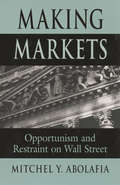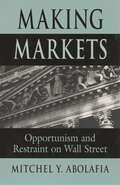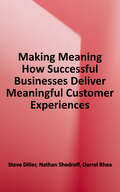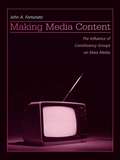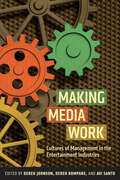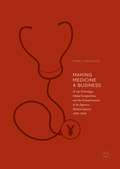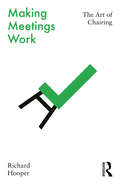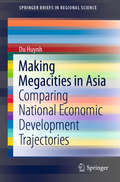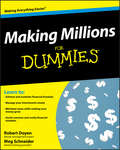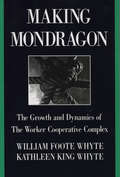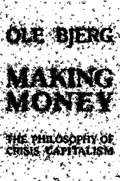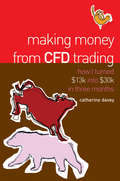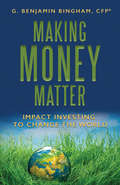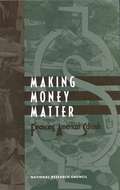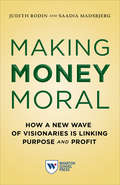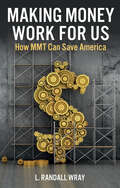- Table View
- List View
Making Markets More Inclusive
by Kevin Mckague Muhammad SiddiqueeMost studies of doing business at the "bottom of the economic pyramid" focus on viewing the poor as consumers, as micro-entrepreneurs, or as potential employees of local companies. Almost no analysis focuses on the poor as primary producers of agricultural commodities a striking omission given that primary producers are by far the largest segment of the working-age population in developing economies. Making Markets More Inclusive bridges the management literature with original research on agricultural value chains in developing and emerging economies. This exciting work is the first to delve into the skills, capabilities, strategies and approaches needed for inclusive value chain development. McKague shows how NGOs and companies can connect poor producers in developing economies with the right markets to better create social and economic impact. He also analyzes one of the leading agricultural value chain initiatives in the world, which is being replicated by the Bill and Melinda Gates Foundation in several different value chains in Malawi, Tanzania, Ghana, India, and Mali. Want more? Check out these compelling videos, which provide a glimpse into the stories and examples used throughout the book. Video Trailer for Making Markets More Inclusive. Farmer Training. Kallani Rani increased the productivity of her cows, become a cattle feed seller in her village (Chapter 6), and opened a fresh milk canteen in her local market (Chapter 7). She now trains other women farmers and works to improve opportunities for women in her community (Chapter 5). Animal Health Care Services. Asma Husna trained to be an animal health worker with CARE to provide important animal health services and education to local farmers on a fee-for-service basis (Chapter 6). Cattle Feed Shops. Fulera Akter started a business as a cattle feed seller after demand for nutritional animal feed grew due to farmers' improved knowledge of nutrition (Chapter 6). Savings Groups. Coauthor Muhammad Siddiquee, the Coordinator of Agriculture and Value Chain Programs at CARE Bangladesh, discusses the value of farmer savings groups (Chapter 6). Milk Collection. Sarothi Rani became a milk collector to earn an improved income for her family and provide an important service to other dairy farmers in her community (Chapter 7). Digital Fat Testing. Introducing digital fat testing machines into the dairy value chain helped reward farmers for making investments in producing higher quality milk, as well as ensuring transparent and timely payments (Chapter 7). Microfranchising. Supporting agricultural input shop owners with training, relationships to suppliers, common branding, and standardized customer services improves the productivity of smallholder farmers and the profitability of shops (Chapter 12). Bangladesh Dairy Value Chain Learning. Reflections from some of the 40 CARE staff from 17 countries who came to Bangladesh to learn from the experience of the dairy value chain project (Chapter 15).
Making Markets in Australian Agriculture: Shifting Knowledge, Identities, Values, and the Emergence of Corporate Power
by Patrick O'KeeffeThis book provides a genealogical study of Australian agricultural restructuring, focusing on the case study of wheat export market deregulation. This policy shift was implemented in 2008, ending 60 years of statutory wheat marketing. At the time, policy makers claimed that market liberalisation would empower individual growers, providing them with choice and freedom through uninhibited participation in markets. However, regional wheat markets have become concentrated, and are increasingly controlled by a small number of transnational agribusiness firms, which have been increasingly active in setting the policy agenda in Australian agriculture. The book delves into the discursive construction of policy truths such as efficiency, competition, and the consumer, to understand how this shift was made possible, whose interests have been served, and what the implications of this shift have been. This book focuses on the machinations which contributed to this shift by examining the construction of knowledge, values and identities, which have helped to make the transition from the public to the private appear as a logical, common sense solution to the challenges facing Australian agriculture. The author shows how governmental technologies such as audit, cost-benefit analysis, performance objectives and the consumer were used to make this reality operable. In doing so, he argues that this shift should be viewed as part of the broader restructuring of Australian society, which has facilitated the transference of economic and policy making power from the public to the private.
Making Markets: Opportunism and Restraint on Wall Street
by Mitchel Y. Abolafia"In the wake of million-dollar scandals brought about by Michael Milken, Ivan Boesky, and their like, Wall Street seems like the province of rampant individualism operating at the outermost extremes of self-interest and greed. But this, Mitchel Abolafia suggests, would be a case of missing the real culture of the Street for the characters who dominate the financial news. Making Markets, an ethnography of Wall Street culture, offers a more complex picture of how the market and its denizens work. Not merely masses of individuals striving independently, markets appear here as socially constructed institutions in which the behavior of traders is suspended in a web of customs, norms, and structures of control. Within these structures we see the actions that led to the Drexel Burnham and Salomon Brothers debacles not as bizarre aberrations, but as mere exaggerations of behavior accepted on the Street. Abolafia looks at three subcultures that coexist in the world of Wall Street: the stock, bond, and futures markets. Through interviews, anecdotes, and the author’s skillful analysis, we see how traders and New York Stock Exchange “specialists” negotiate the perpetual tension between short-term self-interest and long-term self-restraint that marks their respective communities—and how the temptation toward excess spurs market activity. We also see the complex relationships among those market communities—why, for instance, NYSE specialists resent the freedoms permitted over-the-counter bond traders and futures traders. Making Markets shows us that what propels Wall Street is not a fundamental human drive or instinct, but strategies enacted in the context of social relationships, cultural idioms, and institutions—a cycle that moves between phases of unbridled self-interest and collective self-restraint."
Making Markets: Opportunism and Restraint on Wall Street
by Mitchel Y. Abolafia"In the wake of million-dollar scandals brought about by Michael Milken, Ivan Boesky, and their like, Wall Street seems like the province of rampant individualism operating at the outermost extremes of self-interest and greed. But this, Mitchel Abolafia suggests, would be a case of missing the real culture of the Street for the characters who dominate the financial news. Making Markets, an ethnography of Wall Street culture, offers a more complex picture of how the market and its denizens work. Not merely masses of individuals striving independently, markets appear here as socially constructed institutions in which the behavior of traders is suspended in a web of customs, norms, and structures of control. Within these structures we see the actions that led to the Drexel Burnham and Salomon Brothers debacles not as bizarre aberrations, but as mere exaggerations of behavior accepted on the Street. Abolafia looks at three subcultures that coexist in the world of Wall Street: the stock, bond, and futures markets. Through interviews, anecdotes, and the author’s skillful analysis, we see how traders and New York Stock Exchange “specialists” negotiate the perpetual tension between short-term self-interest and long-term self-restraint that marks their respective communities—and how the temptation toward excess spurs market activity. We also see the complex relationships among those market communities—why, for instance, NYSE specialists resent the freedoms permitted over-the-counter bond traders and futures traders. Making Markets shows us that what propels Wall Street is not a fundamental human drive or instinct, but strategies enacted in the context of social relationships, cultural idioms, and institutions—a cycle that moves between phases of unbridled self-interest and collective self-restraint."
Making Meaning of Being Bad: Different Forms of Bad Leadership
by Barbara KellermanLeaders are bad either because they are ineffective, or unethical. They can further be broken down into seven types, a list that ranges from incompetent to evil. Along with an overview of seven types, this chapter contains brief real-life examples of leaders who fit into each one. Examining this list will enable you to know more clearly what bad leadership looks like.
Making Meaning: How Successful Businesses Deliver Meaningful Customer Experiences
by Nathan Shedroff Steve Diller Darrel RheaIn a market economy characterized by commoditized products and global competition, how do companies gain deep and lasting loyalty from their customers? The key, this book argues, is in providing meaningful customer experiences. Writing in the tradition of Louis Cheskin, one of the founding fathers of market research, the authors of Making Meaning observe, define, and describe the meaningful customer experience. By consciously evoking certain deeply valued meanings through their products, services, and multidimensional customer experiences, they argue, companies can create more value and achieve lasting strategic advantages over their competitors. A few businesses are already discovering this approach, but until now no one has articulated it in such a persuasive and practical way. Making Meaning not only encourages businesses to adopt an innovation process that's centered on meaning, it also tells you how. The book outlines a plan of action and describes the attributes of a meaning-centric innovation team. With insightful real-world examples drawn from the Cheskin company's experience and from the authors' observations of the contemporary global market, this book outlines a plan of action and describes the attributes of a meaning-centric innovation team. Meaningful experiences--as distinct from trivial ones--reinforce or transform the customer's sense of purpose and significance. The authors' vision of a world of meaningful consumption is idealistic, but don't be fooled: this is a straightforward business book with an eye on the ROI. It shows how to bring R&D, design, and marketing together to create deeper and richer experiences for your customers. Making Meaning: How Successful Businesses Deliver Meaningful Customer Experiences is an engaging and practical book for business leaders, explaining how their companies can create more meaningful products and services to better achieve their goals.
Making Media Content: The Influence of Constituency Groups on Mass Media (Routledge Communication Series)
by John A. FortunatoMaking Media Content addresses the development of media content and the various factors and constituencies that influence content, such as advertisers, corporate interests, owners, and advocacy groups. It examines the strategic decision-making of mass media organizations as they determine what content they present to their audiences through broadcast, publication, or electronic access. The work focuses on the internal and external influences on media content, laying out the various processes and opening up the topic for further consideration.This book will appeal to academics in mass media, especially those studying the relationship between mass media organizations and public relations, and advertisers. Practitioners of the media, public relations, and advertising fields would be interested because there are practical applications to their industries and explanations of the communication interactions between these groups.
Making Media Work: Cultures of Management in the Entertainment Industries (Critical Cultural Communication #17)
by Derek JohnsonThe management and labor culture of the entertainment industry. In popular culture, management in the media industry isfrequently understood as the work of network executives, studio developers, andmarket researchers—“the suits”—who oppose the more productive forces ofcreative talent and subject that labor to the inefficiencies and risk aversionof bureaucratic hierarchies. However, such portrayals belie the realityof how media management operates as a culture of shifting discourses,dispositions, and tactics that create meaning, generate value, and shape mediawork throughout each moment of production and consumption.Making Media Work aims to provide a deeper and more nuanced understanding ofmanagement within the entertainment industries. Drawing from work in criticalsociology and cultural studies, the collection theorizes management as apervasive, yet flexible set of principlesdrawn upon by a wide range ofpractitioners—artists, talent scouts, performers, directors, show runners, andmore—in their ongoing efforts to articulate relationships and bridgepotentially discordant forces within the media industries. The contributorsinterrogate managerial labor and identity, shine a light on how managementunderstands its roles within cultural and creative contexts, and reconfigurethe complex relationship between labor and managerial authority as productiverather than solely prohibitive. Engaging with primary evidence gathered throughinterviews, archives, and trade materials, the essays offer tremendous insightinto how management is understood and performed within media industry contexts.The volume as a whole traces the changing roles of management both historicallyand in the contemporary moment within US and international contexts, and acrossa range of media forms, from film and television to video games and socialmedia.
Making Medicine a Business
by Pierre-Yves DonzéThis book goes back to the origins of the transformation of health and medicine into a business, during the first part of the twentieth century, focusing on the example of Japan. In the past hundred years, medicine has gone from being a charitable activity to a large economic sector, amounting to 12–15% of the GDP in many developed countries, and one of the fastest-growing businesses around the world. Despite the mounting presence of the medical industry, there is a lack of academic work detailing this major transformation. The objective of this book is to fill this gap and address the following question: how did medicine become a business? Using over ten years of research in the field, Pierre-Yves Donzé argues that economic factors and business factors were decisive in transforming the way that medicine enters our lives. This book will be of interest to historians of medicine, business historians, health economists, scholars in medical humanities, and more.
Making Medicines in Africa: The Political Economy of Industrializing for Local Health (International Political Economy Series)
by Maureen Mackintosh Geoffrey Banda Paula Tibandebage Watu WamaeThe importance of the pharmaceutical industry in Sub-Saharan Africa, its claim to policy priority, is rooted in the vast unmet health needs of the sub-continent. Making Medicines in Africa is a collective endeavour, by a group of contributors with a strong African and more broadly Southern presence, to find ways to link technological development, investment and industrial growth in pharmaceuticals to improve access to essential good quality medicines, as part of moving towards universal access to competent health care in Africa. The authors aim to shift the emphasis in international debate and initiatives towards sustained Africa-based and African-led initiatives to tackle this huge challenge. Without the technological, industrial, intellectual, organisational and research-related capabilities associated with competent pharmaceutical production, and without policies that pull the industrial sectors towards serving local health needs, the African sub-continent cannot generate the resources to tackle its populations' needs and demands.
Making Meetings Work: The Art of Chairing
by Richard HooperMaking Meetings Work is a short book which aims to help people chair meetings better – meetings of all kinds from community playgroups to conferences and dinners to large corporate Boards. The book is based on the personal experience of a professional working chair over many years. The book is aimed at younger men and women who are beginning to chair their first meetings, and also at more experienced chairs who want to develop their skills.
Making Megacities in Asia: Comparing National Economic Development Trajectories (SpringerBriefs in Regional Science)
by Du HuynhThis book analyses and compares the development paths of five major cities in East and Southeast Asia since the early 1960s, including Ho Chi Minh City, Jakarta, Manila, Seoul, and Shanghai. In examining these five cases through a carefully crafted conceptual framework, the author excavates an understanding of the dynamics that have enabled Seoul and Shanghai to become highly competitive as major engines of economic growth, while simultaneously accounting for why the other three cities have faced numerous problems in terms of meeting their development goals. Presenting both quantitative and qualitative data to trace the course of changes between 1960 and 2015, the case studies curate six possible explanations for the different cities’ developmental trajectories. The book considers the national development strategy matters to the development of cities and positions the share of budget revenue retained for cities’ expenditure as critical. The author demonstrates that consistently pursuing long-term strategies is important, and that public entrepreneurship with powerful supporting coalitions is vital. The book illustrates how master plans have played limited roles in the building of cities, and that fragmented governments are often at the root of the problems facing a city’s development. This book will be highly relevant to researchers in international and Asian urban development.
Making Miami: The Historic Rise of the Magic City
by Lawrence R. Samuel&“Very informative—includes subject areas that have remained underserved in terms of historiography.&”—Paul George, Resident Historian, HistoryMiami MuseumMaking Miami takes a deep dive into the history, growth, and development of the city not just in terms of real estate but also a number of other topics, including the expansion of a transportation and infrastructural network; tourism; the natural ecosystem and threats from residential, recreational, and industrial development; and issues of race, class, ethnicity, immigration, and nationality.The history of Miami unfolds chronologically, revealing how real estate has consistently fueled its growth. The narrative begins in the Roaring Twenties, when substantial investments flooded into Florida, sparking a land boom that attracted both investors and new residents. The decades of the 1920&’s and 30&’s transformed Miami from a sleepy southern town into the unique city it is today. As the Great Depression cast its shadow, a handful of bold developers took center stage, creating the iconic art deco district of South Beach. The active World War II years saw Miami become a home for many servicemen and servicewomen stationed there. Postwar challenges in the 1960s and 1970s tested the city&’s resilience, as the economic engine sputtered and urban strife reshaped its fabric. However, the 1980s marked a construction renaissance for Miami, driven by funds from sometimes questionable sources. Despite occasional setbacks, Miami&’s real estate market is once again thriving, drawing people from far and wide to visit or make it their home.
Making Migration Work: The Future of Labour Migration in the European Union (WRR Publicatie)
by Erik Schrijvers Monique Kremer Jan Willem HoltslagThe complexion of labour migration in the European Union (EU) has altered in recent years. Not only has there been a shift in the length of time labour migrants spend abroad, but the nature, scale and direction of the migration flows have also changed dramatically. The enlargements of the EU in 2004 and 2007 were influential in this respect. A growing economy and large wage gaps encouraged a large stream of workers to leave the new Member States for the old. The EU’s open internal borders made it easy for them to return home or to move on to another Member State. This publication considers what this means for the future of labour migration and how policy should address this issue.
Making Millions For Dummies
by Meg Schneider Robert DoyenThe must-have guide to achieving great wealthMaking Millions For Dummies lays out in simple, easy-to-understand steps the best ways to achieve wealth. Through a proven methodology of saving, building a successful business, smart investing, and carefully managing assets, this up-front, reliable guide shows readers how to achieve millionaire or multimillionaire status. It provides the lowdown on making wise financial decisions, with guidance on managing investments and inheritances, minimizing taxes, making money grow, and, most important, how to avoid common and costly financial mistakes. Millionaire wannabes will see how to maintain financial security throughout their life with this easy-to-follow road map to financial independence. For individuals who yearn to make millions but don't want to be restricted to owning or running a business, the book features other options, such as inventing and patenting the next big thing, consulting, selling high-value collectibles, and flipping or owning real estate.
Making Mondragón: The Growth and Dynamics of the Worker Cooperative Complex
by William Foote Whyte Kathleen King WhyteSince its founding in 1956 in Spain's Basque region, the Mondragón Corporation has been a touchstone for the international cooperative movement. Its nearly three hundred companies and organizations span areas from finance to education. In its industrial sector Mondragón has had a rich experience over many years in manufacturing products as varied as furniture, kitchen equipment, machine tools, and electronic components and in printing, shipbuilding, and metal smelting. Making Mondragón is a groundbreaking look at the history of worker ownership in the Spanish cooperative. First published in 1988, it remains the best source for those looking to glean a rich body of ideas for potential adaptation and implementation elsewhere from Mondragón's long and varied experience. This second edition, published in 1991, takes into account the major structural and strategic changes that were being implemented in 1990 to allow the enterprise to compete successfully in the European common market. Mondragón has created social inventions and developed social structures and social processes that have enabled it to overcome some of the major obstacles faced by other worker cooperatives in the past. William Foote Whyte and Kathleen King Whyte describe the creation and evolution of the Mondragón cooperatives, how they have changed through decades of experience, and how they have struggled to maintain a balance between their social commitments and economic realities. The lessons of Mondragón apply most clearly to worker cooperatives and other employee-owned firms, but also extend to regional development and stimulating and supporting entrepreneurship, whatever the form of ownership.
Making Money
by Ole BjergWhat is money? Where does it come from? Who makes our money today? And how can we understand the current state of our economy as a crisis of money itself? In Making Money, Ole Bjerg turns these questions into a matter of philosophical rather than economic analysis. Using the thinking of Slavoj i ek, while still engaging with mainstream economic literature, the book provides a genuinely philosophical theory of money. This theory is unfolded in reflections on the nature of monetary phenomenon such as financial markets, banks, debt, credit, derivatives, gold, risk, value, price, interests, and arbitrage. The analysis of money is put into an historical context by suggesting that the current financial turbulence and debt crisis are symptoms that we live in the age of post-credit capitalism. By bridging the fields of economics and contemporary philosophy, Bjerg's work engages in a productive form of intellectual arbitrage.From the Trade Paperback edition.
Making Money From CFD Trading: How I Turned $13K Into $30K in 3 Months
by Catherine DaveyContracts for difference or 'CFDs' have taken Australian traders by storm. Catherine Davey's first book on the subject, Contracts for Difference: Master the Trading Revolution, was a great success; in this follow-up, she shares her real-life CFD trading experiences over a three-month period in 2005. During this time, she manages to turn $13000 into $30000, but her path to success is anything but straight and simple. Making Money from CFD Trading describes not only the reasoning behind and execution of her trading strategies, but also presents an honest, inspiring and often humorous discussion of her emotional journey as a trader. Catherine gives a fascinating insight into the trading experience: struggling to maintain the right psychology, avoiding irrational 'ego trades' and finding emotional balance between depressing losses and big wins. She presents a range of opinions from industry experts and commentators, discussing day-to-day trading issues and sharing controversial market views. This book will give you an understanding of: simple charting techniques that make money the unique aspects of trading CFDs how to exploit the advantages CFD trading has over traditional share trading strategies for establishing and maintaining a winning mental approach. This entertaining and hugely informative book is a must-read for anyone who wants to know more about CFDs and for traders of any financial instrument who want to take their performance to the next level.
Making Money From Stocks and Shares: A Simple Guide To Increasing Your Wealth By Consistent Investment In The Stock Market
by Jamie E SmithMany people are intimidated by the stock market and choose instead to put their money into savings accounts that pay very little. They believe that: - Buying shares is too risky - Buying shares is too complicated - You need a lot of money for it to be worthwhile. But none of these things are true and this book explains why. It provides a simple and accessible introduction to the basic principles of investing in the stock market. With an understanding of these, and a consistent approach to investment, you can make a good return from stocks and shares. In this book you will discover: - How to use the way you and others behave to your advantage; - How to get more than you pay for; - How to increase your wealth over time by consistently following some really simple steps.
Making Money From Stocks and Shares: A simple guide to increasing your wealth by consistent investment in the stock market
by Jamie E SmithMany people are intimidated by the stock market and choose instead to put their money into savings accounts that pay very little. They believe that: - Buying shares is too risky - Buying shares is too complicated - You need a lot of money for it to be worthwhile. But none of these things are true and this book explains why. It provides a simple and accessible introduction to the basic principles of investing in the stock market. With an understanding of these, and a consistent approach to investment, you can make a good return from stocks and shares. In this book you will discover: - How to use the way you and others behave to your advantage; - How to get more than you pay for; - How to increase your wealth over time by consistently following some really simple steps.
Making Money Matter
by G. Benjamin BinghamThe way we think about money has extraordinary impact. This book satisfies the growing longing for a financial overview that can provide practical advice and demonstrate how money is a social tool. Making Money Matter introduces the reader to common money mistakes, and the dysfunctional nature of the current financial framework. Its overview of the SRI world will inspire investors to push their advisors’ envelope while providing new strategies to meet the demand for positive impact. It provides a philosophical basis for transforming our view of money from an end unto itself to a means to change the world for the better. This book traces the author's journey from early financial innocence to an appreciation of how money works and how it can be transformed. People who care about the planet and society at large need a bridge from deeply felt values to practical understanding and advice that will lead to a new money paradigm. This new approach covers all aspects of money from everyday transactions to high impact investment options. It describes a new investment paradigm that will support both reasonable returns and long-term societal and planetary health. Socially Responsible Investing (SRI) is well established for smaller scale investors in the public space and impact investing for accredited and qualified investors is taking hold in the private-space. Readers want more than flat definitions, and need an inclusive overview that can inspire investors on all levels to move the trillions required for addressing the world’s many dire problems. This book’s unique contribution is a personal, practical and holistic approach to socially conscious investing, which engages the reader in a way that is both healing and empowering. Making Money Matter is designed for mass appeal. First, its biographical, true-confessions format introduces the reader to common money mistakes made by the author, while personalizing the dysfunctional nature of the current financial framework. Secondly, its personalized overview of the countermovement of socially-conscious investment options is designed to inspire investors to push their advisors’ advice-envelope while providing investment managers with practical new strategies to meet the burgeoning demand for positive impact. Finally, this book provides a philosophical basis for the new money paradigm that shows how to transform our view of money from an end unto itself to a means to change the world for the better. This book is aimed at people who are concerned about Wall Street, banking and our current monetary and finance system, average investors, businessmen, progressives, libertarians or fiscal conservatives. However it should be of particular interest to investment professionals looking for new ways of meeting their clients’ needs. Investment managers and consultants need to be educated about this space. This book should be as popular among family office associations as the Chartered Financial Analysts Association. But this book's ultimate goal is to provide inspiration to all levels of investors. Everyone uses money, and the way we think about money has more impact than all the impact investments put together. This thinking needs to change. Just as consumers drove the growth of the local and organic movements, investors will drive the new money paradigm. This may help anyone to begin to think about the real bottom line of every transaction, which is the impact of our actions on the planet - includingall living beings that inhabit it.
Making Money Matter: Financing America's Schools
by National Research CouncilThe United States annually spends over $300 billion on public elementary and secondary education. As the nation enters the 21st century, it faces a major challenge: how best to tie this financial investment to the goal of high levels of achievement for all students. In addition, policymakers want assurance that education dollars are being raised and used in the most efficient and effective possible ways. The book covers such topics as: Legal and legislative efforts to reduce spending and achievement gaps.The shift from "equity" to "adequacy" as a new standard for determining fairness in education spending.The debate and the evidence over the productivity of American schools.Strategies for using school finance in support of broader reforms aimed at raising student achievement. This book contains a comprehensive review of the theory and practice of financing public schools by federal, state, and local governments in the United States. It distills the best available knowledge about the fairness and productivity of expenditures on education and assesses options for changing the finance system.
Making Money Moral: How a New Wave of Visionaries Is Linking Purpose and Profit
by Judith Rodin Saadia Madsbjerg“As we look ahead to the recovery from the COVID-19 crisis, Making Money Moral could not come at a better time.”—Jamie Dimon, Chairman and Chief Executive Officer, JPMorgan ChaseThe math doesn’t add up: Global financial markets can no longer ignore the world’s most critical problems. The risks are too high and the costs too great.In Making Money Moral: How a New Wave of Visionaries Is Linking Purpose and Profit, authors Judith Rodin and Saadia Madsbjerg explore a burgeoning movement of bold and ambitious innovators. These trailblazers are unlocking private-sector investments in new ways to solve global problems, from environmental challenges to social issues such as poverty and inequality. They are earning great returns and reimagining capitalism in the process. Pioneers in the field of sustainable and impact investing, Rodin and Madsbjerg offer first-hand stories of how investors of every type and in every asset class are investing in world-changing solutions—with great success. Meet the visionaries who are leading this movement:The investment managers putting trillions of dollars to work, like TPG, Wellington Management, State Street Global Advisors, Nuveen, Amundi, APG and Natixis;The asset owners driving the transition, like GPIF and PensionDanmark;A new generation of entrepreneurs benefiting from the investments, like DreamBox Learning, an innovative educational technology platform, and Goodlife Pharmacies, which is disrupting the traditional notion of a pharmacy; The corporations that are repurposing their business models to meet demand for sustainable products and services, like Ørsted; andThe nonprofits that are reimagining how to raise money for their work while creating significant value for investors, like The Nature Conservancy.In their book, Rodin and Madsbjerg offer a deep look at the most powerful tools available today—and how they can be unlocked. They reveal:Who the investors are and what they want;How innovative products and investment strategies can deliver long-term value for investors while improving lives and protecting ecosystems;How leaders can build strategies and prepare their organizations to enter and expand this dynamic market; andHow to measure impact, understand critical regulations, and avoid potential pitfalls.A roadmap to making the financial market a force for good, Making Money Moral is a must-read for those seeking private-sector capital to address a big problem, as well as those seeking both to mitigate risk and to invest in big solutions.“Judith Rodin and Saadia Madsbjerg identify an important new way of looking at money: from the root of all evil to the fount of all solutions. Their timely, important book on impact investing is full of powerful insights and compelling examples they’ve seen firsthand. Their work will be sure to accelerate momentum toward a more sustainable world.”—Rosabeth Moss Kanter, Harvard Business School Professor and Author of Think Outside the Building: How Advanced Leaders Can Change the World One Smart Innovation at a Time
Making Money Simple: The Complete Guide to Getting Your Financial House in Order and Keeping It That Way Forever
by Peter LazaroffSimplify your financial life and ensure financial success into the future Feeling paralyzed by the overwhelming number of complex decisions you need to make with your money? You don’t need to be an expert to achieve financial freedom. You just need a framework that makes the right choices simple and easy to make. Making Money Simple provides that much-needed process so you can get on the right track to long-term financial security. This valuable resource provides a solid foundation for all the nuanced personal finance decisions you need to make as you go through your career, hit major life milestones, and look to grow wealth. It’s a blueprint for financial achievement—even through tough-to-navigate situations where there are no clear-cut rules. After you read Making Money Simple, you’ll be able to create your personal plan for success using proven wealth management methods and real-world financial strategies. From basic financial principles to advanced investing techniques, you’ll get comprehensive coverage of fundamental financial topics with easy-to-follow advice from author Peter Lazaroff, who draws from his expertise as the Chief Investment Officer of a multi-billion-dollar wealth management firm to give you the tools you need to simplify your financial situation and make the right moves at every opportunity. Getting your finances in order doesn’t have to be hard. It doesn’t require fancy, convoluted investment strategies. Nor does it require keeping track of detailed spreadsheets. You just need this step-by-step process to get your financial house in order and keep it that way forever. It doesn’t matter what your specific situation is. We all need to understand our money—and what to do with it. Making Money Simple shows you how to: ● Develop clear financial goals and plan for your future ● Understand the three crucial elements of building a strong financial house ● Implement effective investment strategies to grow your wealth and avoid costly mistakes ● Learn ten smart questions to ask when hiring financial professionals For those seeking to secure a solid financial future, Making Money Simple: A Complete Guide to Getting Your Financial House in Order and Keeping It That Way Forever is the roadmap to get you there.
Making Money Work for Us: How MMT Can Save America
by L. Randall WrayIs money precious and scarce, necessitating iron fiscal discipline? Must the government always balance the books or risk ruin? Or is money, in fact, a flexible tool that can be used to mobilize our collective resources to serve those who need them? In this book, leading Modern Money Theory (MMT) advocate Randy Wray explains that the only real constraints on public policy are physical resources, technological capacity and political will: but never money. He shows how modern sovereign governments spend by keystroking money to bank accounts. While taxes serve other important purposes, they do not – contrary to popular belief – fund spending. If we recognize this, and totally reframe how we think about money and debt, we can marshal our national wealth to make us all richer, eliminate unemployment and &“look after our own.&” We can make money work for us – the US. This book's account shows how MMT can become a new American political and economic orthodoxy, replacing the dominant conservative framework forever. It is essential reading for all progressives.


